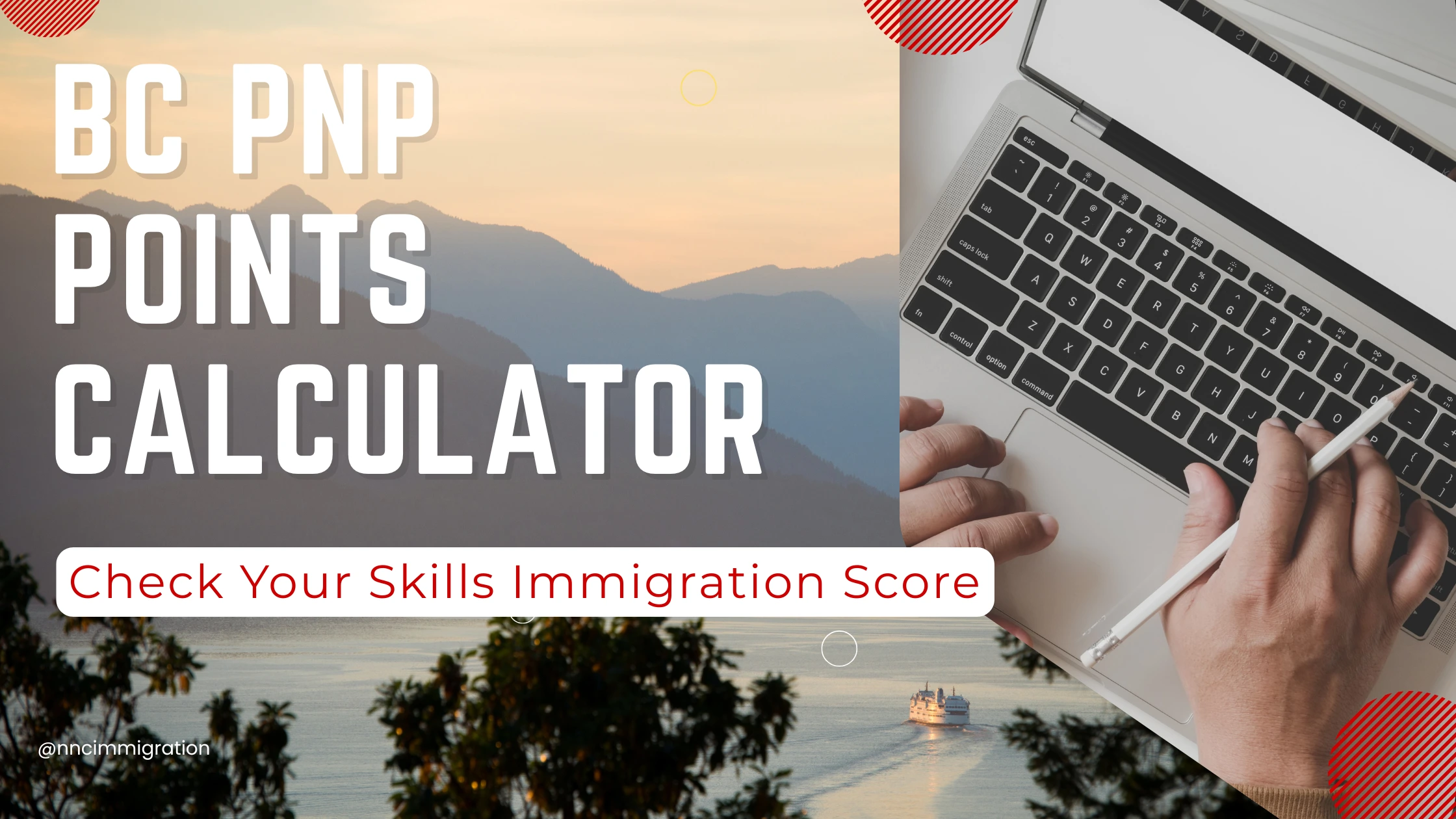The British Columbia Provincial Nominee Program (BC PNP) is a popular way to get Canadian permanent residence. If you want to apply under the Skills Immigration stream, your points matter. A higher score can improve your chance to be invited by the province.
In this post, we explain how BC PNP points work in simple words—then invite you to check your score instantly.
Skip the guesswork — Try the BC PNP Calculator (Free)
What is the BC PNP Skills Immigration Stream?
Skills Immigration is for workers with the skills B.C. needs. It usually requires:
- A qualified job offer from a B.C. employer (full-time, often indeterminate),
- The right NOC/TEER level for your occupation,
- Proof of education, language ability, and work experience.
Your points affect your ranking and your chance to get an invitation to apply for nomination.
How the BC PNP Points System Works
BC PNP looks at both who you are and your job offer details. In simple terms, your points come from:
Human Capital
- Education: Higher education usually earns more points.
- Work Experience: More years in skilled roles can increase your score.
- Language: Strong English and/or French results boost points.
Economic Factors
- Wage: Higher wage = more points. BC often compares your wage to typical wages for your role.
- Occupation / TEER: Some occupations may be prioritized depending on B.C.’s needs.
- Offer Type: Full-time, indeterminate roles are strong; employer must meet program rules.
Regional Factors
- Job location in B.C.: Roles outside Metro Vancouver can earn extra points. This helps support regional communities.
Calculate Your Score in 60 Seconds → [BC PNP Calculator]
Regional Factors: Why Location in B.C. Changes Your Points
B.C. wants to grow communities across the province, not only in the big city. That’s why jobs in regional B.C. (outside Metro Vancouver) can add extra points.
What is Metro Vancouver?
It’s the main metropolitan area around Vancouver. Many other cities and towns in B.C. are considered regional and may award more points.
Mini Example (Regional Impact):
- Offer A: NOC 21231 (Software Engineer) in Vancouver, $40/hr
- Offer B: Same NOC and wage in Kelowna
- Even with the same job and pay, Offer B (Kelowna) may score higher because it’s in regional B.C.
See your regional points instantly → [Use the Calculator]
Job Offer Analysis: Does Your Offer Help or Hurt?
Your job offer drives a big part of your score. Points can change based on:
- Wage: Convert your hourly wage to a yearly amount (hourly × 40 hours × 52 weeks). Higher wages often earn more points.
- NOC/TEER: Make sure your job duties match the NOC, not just the title.
- Employer & Role Type: Full-time, indeterminate roles from eligible employers are usually required. Some roles may need licensing or professional status.
Mini Example (Wage & Location Impact):
- Offer C: Retail Supervisor in Vancouver at $24/hr
- Offer D: Same role in Prince George at $28/hr
- Offer D may score higher because of both higher wage and regional location.
Test your job offer’s impact → [BC PNP Calculator]
Step-by-Step: Estimate Your BC PNP Points Manually
You can estimate your score by hand, but it’s easy to miss small details. Here’s a quick way:
- Gather your info
- Job offer letter (title, wage, hours, location)
- NOC/TEER code for your role
- Education (Canadian or ECA if foreign)
- Language test results (IELTS/CELPIP/TEF/TCF)
- Work experience (years, duties, full-time/part-time)
- Assign points for Human Capital
- Education level, valid language scores, total skilled experience.
- Add Economic + Regional points
- Wage level, occupation/TEER, job location (Metro vs. regional B.C.).
- Double-check requirements
- Full-time, indeterminate job?
- Employer meets BC PNP rules?
- NOC matches your actual duties?
Note: Manual math can be confusing, especially with wage bands and regional rules. Verify with our BC PNP Calculator in seconds.
Common Mistakes to Avoid
- Wrong NOC/TEER: Pick the NOC that matches your duties, not just your job title.
- Forgetting regional points: A job outside Metro Vancouver can lift your score—don’t ignore this.
- Wage not annualized: Always convert hourly wage to a standard full-time yearly amount.
- Expired or missing language tests: Keep tests valid and at the right level.
- Assuming all offers qualify: The role must be full-time (and often indeterminate) and the employer must meet program rules.
FAQs (Quick Answers)
Do I need a job offer for Skills Immigration?
Usually yes. Most Skills Immigration categories require a valid, full-time job offer from an eligible B.C. employer.
Does Metro Vancouver vs. regional B.C. really change points?
Yes. Jobs outside Metro Vancouver often earn extra points to support growth in regional communities.
Which language tests are accepted?
For English: IELTS General or CELPIP General.
For French: TEF Canada or TCF Canada.
Higher scores = more points.
How often should I check my points?
Any time something changes: new job offer, new wage, different location, fresh test scores, new credential—recheck your score.
What if my wage is close to a higher band?
Even a small wage increase can push you into a higher points band. Ask your employer if a raise or a different role is possible.
Do part-time hours count?
Points usually consider full-time roles. If you are part-time, you may need to show an equivalent full-time schedule or meet specific rules. Check your employer letter and program details.



